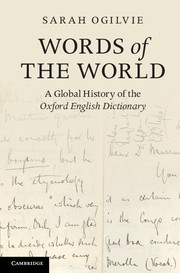Book contents
- Frontmatter
- Contents
- List of illustrations
- List of appendix figures
- Miscellaneous Frontmatter
- Preface
- Acknowledgements
- 1 Entering the OED
- 2 A global dictionary from the beginning
- 3 James Murray and Words of the World
- 4 James Murray and the Stanford Dictionary controversy
- 5 William Craigie, Charles Onions, and the mysterious case of the vanishing tramlines
- 6 Robert Burchfield and words of the world in the OED Supplements
- 7 Conclusion
- Bibliography
- Index
- Plate Section
4 - James Murray and the Stanford Dictionary controversy
Published online by Cambridge University Press: 05 November 2012
- Frontmatter
- Contents
- List of illustrations
- List of appendix figures
- Miscellaneous Frontmatter
- Preface
- Acknowledgements
- 1 Entering the OED
- 2 A global dictionary from the beginning
- 3 James Murray and Words of the World
- 4 James Murray and the Stanford Dictionary controversy
- 5 William Craigie, Charles Onions, and the mysterious case of the vanishing tramlines
- 6 Robert Burchfield and words of the world in the OED Supplements
- 7 Conclusion
- Bibliography
- Index
- Plate Section
Summary
The very plan of Fennell’s work drove him to this method of appropriation of our work, and detraction of our results – insomuch that when met in the street his customary piece of news is ‘I have found barracoon three years earlier than Murray!!!’ which has become a kind of joke in Cambridge.
James Murray (1889) on the making of Charles Fennell’s Stanford Dictionary of Anglicised Words And Phrases (1892)We have seen that James Murray formed a transnational network of OED collaborators, and, by actively seeking words from written sources around the world, he widened the lexicographic net to include words of the world which his contemporaries – OUP superiors, consultants, sub-editors, and reviewers – often judged too ‘barbarous’ or ‘outlandish’ for an English dictionary. This history shows that Murray believed that these words were part of the English language, and therefore deserved a place in an English dictionary. But how high a priority for Murray was their inclusion? When pushed to excise certain entries in order to save space or time, would Murray delete these entries before other subsets of the vocabulary? One way of gauging editorial priorities is to look at annotations on dictionary proofs. An editor’s final changes and edits can be used as a barometer of his/her priorities, prejudices, and attitudes. With respect to foreign words, we know from Murray that he often found it difficult to decide on inclusion. Add to this the pressure that he was under to work faster, to save space, and to exclude words considered too ‘outlandish’ for an English dictionary, and one might expect foreign words to be among the first deletions on dictionary proofs. However, an inspection of the extant dictionary proofs for letters E, F, G, and L has shown no such tendency.
The proofs show that loanwords and World Englishes were no more likely to be excised than any other subset of vocabulary. This only demonstrates, however, that words from outside Britain were no less valued than other words; it does not necessarily imply that they were more valued than any other subset of vocabulary. While it may never be possible to gauge whether these words had priority or extra value in OED1 editing policies and practices, it is possible to gauge how passionate Murray was about their inclusion by seeing his reaction to the suggestion that his coverage of these words be taken by another dictionary.
- Type
- Chapter
- Information
- Words of the WorldA Global History of the Oxford English Dictionary, pp. 104 - 133Publisher: Cambridge University PressPrint publication year: 2012



